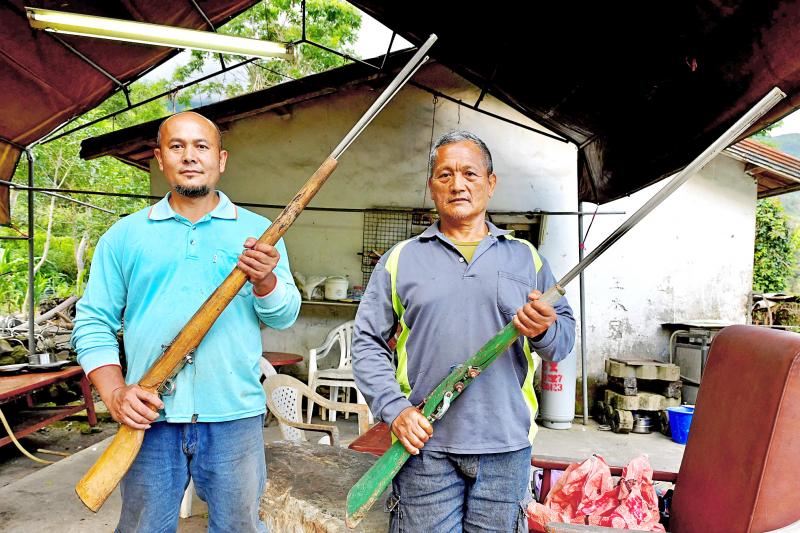President Tsai Ing-wen (蔡英文) yesterday pardoned a Bunun hunter charged in 2013 with killing protected animals, on the first anniversary of her second presidential term.
The pardon of Tama Talum, convicted in 2015 for killing a Reeves’ muntjac and a Formosan serow with a modified shotgun, is the first pardon of Tsai’s two terms since 2016 and the seventh since the enactment of the Constitution on Dec. 25, 1947.
Talum was sentenced to three-and-a-half years in prison for possessing an illegal weapon and hunting protected species. He appealed, and in 2017, the Supreme Court suspended the hearing, but asked the Council of Grand Justices to review hunting regulations under the Controlling Guns, Ammunition and Knives Act (槍砲彈藥刀械管制條例) and the Wildlife Conservation Act (野生動物保育法).

Photo: Sam Yeh, AFP
The Council of Grand Justices on May 7 ruled in Constitutional Interpretation No. 803 that some restrictions on Aborigines were unconstitutional, but stopped short of supporting a total overhaul of the regulations.
The Supreme Court yesterday said that although Talum was pardoned from serving his sentence, it would need to follow procedure until the case is closed, as verdicts from the lower appellate courts still stand.
Presidential Office spokesperson Kolas Yotaka, an Amis, said the decision carried significant weight, especially amid the government’s efforts to promote historical and transitional justice for Aborigines.
The Constitution clearly supports the values of a multiethnic and multicultural society, guaranteeing Aborigines the right to express their culture in the form of hunting, she said.
“The people share their living space with nature. It is part of Aboriginal culture. They live together, they live off each other,” Kolas said, adding that hunting is a natural part of the lives of Aborigines.
Although Talum had contravened certain laws, his actions were within the defined parameters of Aboriginal culture, as stated in Constitutional Interpretation No. 803, and he should be pardoned to show that the government respects Aboriginal culture, she said.
Talum said that he had not yet heard the news of the pardon from his lawyer, adding that he would be happy if it is true.
He said he would not go out of his way to mention it to his 99-year-old mother, for whom he had said he hunted the birds in 2013, given her advanced age and poor memory.
Another hunter Pan Chih-chiang (潘志強), a Puyuma who was sentenced on similar charges and among those petitioning for a constitutional interpretation on hunting, said he was happy to hear of Tsai’s decision, adding that the pardon would help dissolve ethnic tension and confrontation.
Pan in 2014 was sentenced to six months in prison, or a fine of NT$180,000, for killing two Reeves’ muntjacs. He chose to pay the fine.
The Environment and Animal Society of Taiwan said that the pardon was mostly issued due to Talum’s aging mother, adding that Aboriginal communities must step up self-policing of hunting.
There are more than 700 Aboriginal communities nationwide, and if wildlife hunting is not monitored and regulated with a total cap, more wild animals would need legal protection due to overhunting, the society said.

AGING: As of last month, people aged 65 or older accounted for 20.06 percent of the total population and the number of couples who got married fell by 18,685 from 2024 Taiwan has surpassed South Korea as the country least willing to have children, with an annual crude birthrate of 4.62 per 1,000 people, Ministry of the Interior data showed yesterday. The nation was previously ranked the second-lowest country in terms of total fertility rate, or the average number of children a woman has in her lifetime. However, South Korea’s fertility rate began to recover from 2023, with total fertility rate rising from 0.72 and estimated to reach 0.82 to 0.85 by last year, and the crude birthrate projected at 6.7 per 1,000 people. Japan’s crude birthrate was projected to fall below six,

US President Donald Trump in an interview with the New York Times published on Thursday said that “it’s up to” Chinese President Xi Jinping (習近平) what China does on Taiwan, but that he would be “very unhappy” with a change in the “status quo.” “He [Xi] considers it to be a part of China, and that’s up to him what he’s going to be doing, but I’ve expressed to him that I would be very unhappy if he did that, and I don’t think he’ll do that. I hope he doesn’t do that,” Trump said. Trump made the comments in the context

SELF-DEFENSE: Tokyo has accelerated its spending goal and its defense minister said the nation needs to discuss whether it should develop nuclear-powered submarines China is ramping up objections to what it sees as Japan’s desire to acquire nuclear weapons, despite Tokyo’s longstanding renunciation of such arms, deepening another fissure in the two neighbors’ increasingly tense ties. In what appears to be a concerted effort, China’s foreign and defense ministries issued statements on Thursday condemning alleged remilitarism efforts by Tokyo. The remarks came as two of the country’s top think tanks jointly issued a 29-page report framing actions by “right-wing forces” in Japan as posing a “serious threat” to world peace. While that report did not define “right-wing forces,” the Chinese Ministry of Foreign Affairs was

PREPAREDNESS: Given the difficulty of importing ammunition during wartime, the Ministry of National Defense said it would prioritize ‘coproduction’ partnerships A newly formed unit of the Marine Corps tasked with land-based security operations has recently replaced its aging, domestically produced rifles with more advanced, US-made M4A1 rifles, a source said yesterday. The unnamed source familiar with the matter said the First Security Battalion of the Marine Corps’ Air Defense and Base Guard Group has replaced its older T65K2 rifles, which have been in service since the late 1980s, with the newly received M4A1s. The source did not say exactly when the upgrade took place or how many M4A1s were issued to the battalion. The confirmation came after Chinese-language media reported